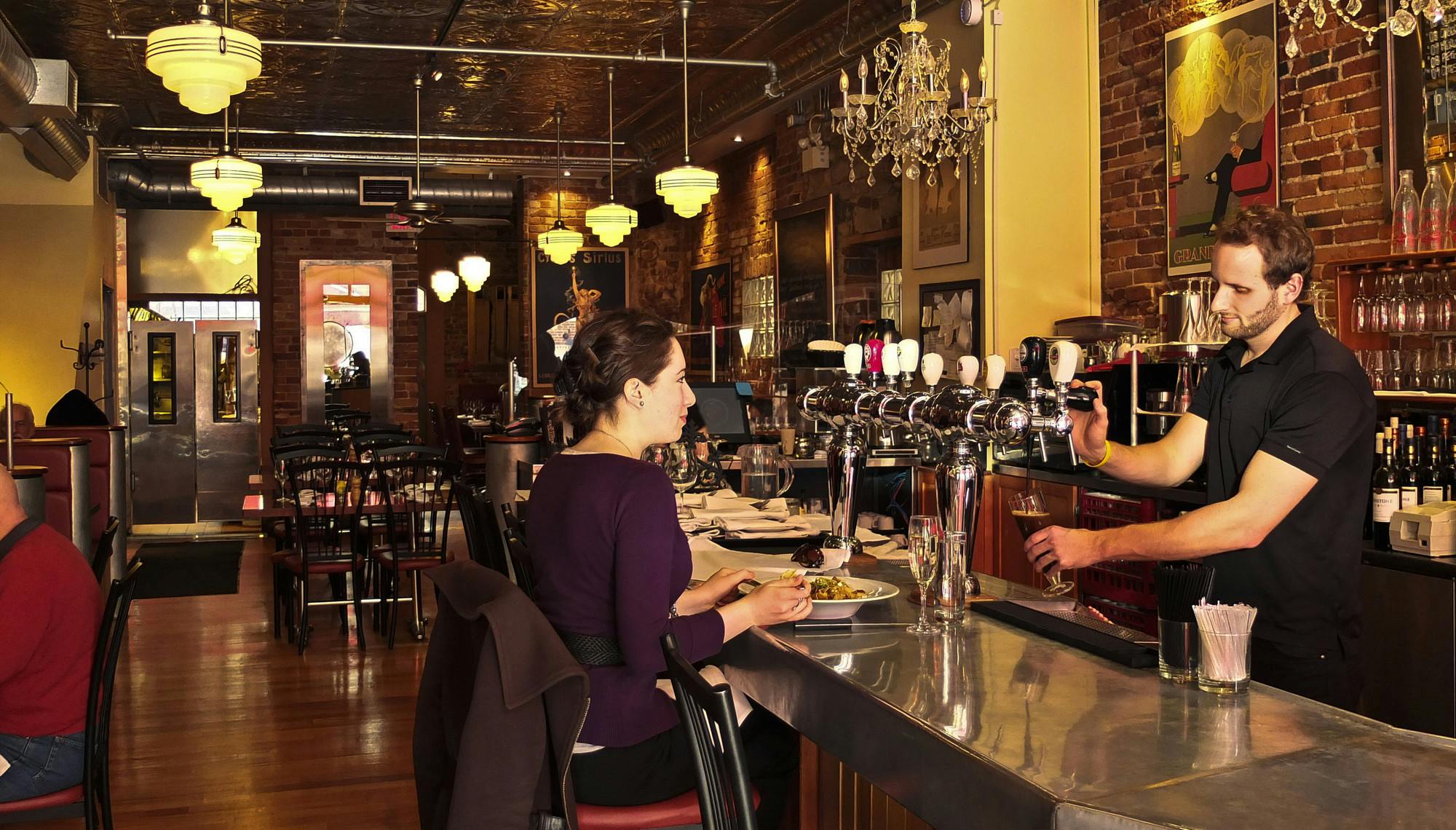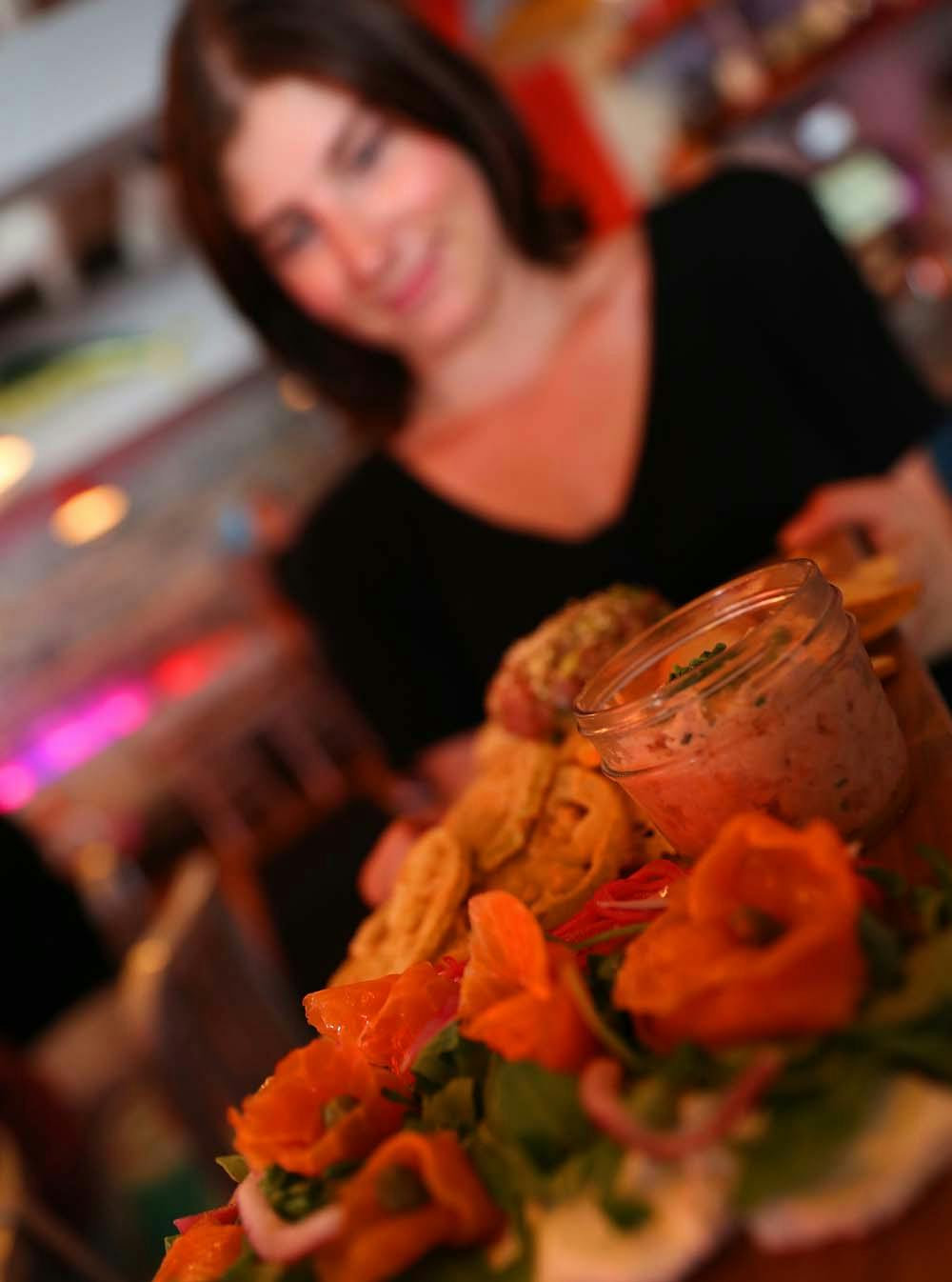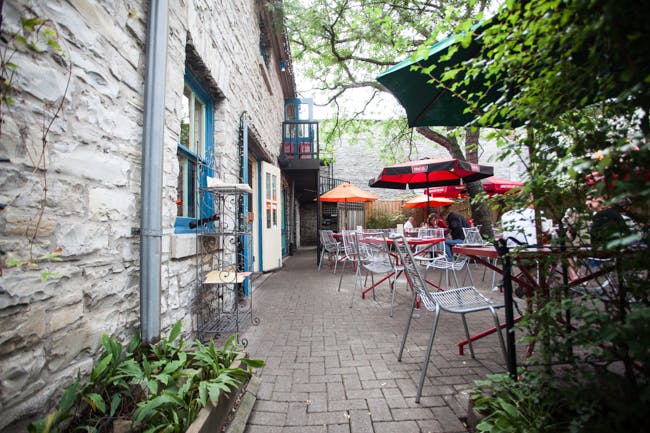Blog Kingston Ontario
Enjoy Kingston's Food and Drink Scene!
What’s Kingston’s culinary scene like?
With more restaurants per capita than almost any other city in Canada, Kingston has something for everyone. Whatever you’re craving, you’ll find it here, from bāo to roti, comfort food to haute cuisine.
Book a table or grab some takeout for a picnic by the waterfront. Take a guided food tour or take part in a food and wine pairing event. Fuel up at one of Kingston’s independent coffee shops, cafés, and bakeries. Grab a latte or a cup of tea, add some freshly baked treats, and plan the rest of your day.
Make sure you don’t miss out on a Canadian staple – the restaurant patio. Kingston has plenty of options, from rooftop patios to cozy courtyards. Kingston is also located in the heart of Frontenac County farmland. Frontenac farms feed Kingston tables, and Kingston chefs utilize fresh, seasonal ingredients from local growers and producers.
What’s Kingston's Brewing history?
Kingston has a long history of beer brewing. The first breweries in the city operated in the 1790s. Rideau Street, in the city’s downtown, was then known as Brewery Street. Farther west, Morton’s Brewery and Distillery was established in 1832. One of its original buildings is now home to the Tett Centre for Creativity and Learning. Established in 1986, the Kingston Brewing Company is Ontario’s oldest brewpub and Canada’s oldest wine-producing pub. It is now one of nine beer and cider makers in the city. You can sample some of Kingston’s brews at bars, restaurants, and festivals across the city. Several beverage makers also offer take-home and delivery options.

Top 5 Tips for Booking a Hotel Online
Author: Helena Cheu
Most people who book a hotel in the modern day start the same way: a quick Google search. We type in the place we’re going and we add the word “hotel” and cross our fingers that the first result just happens to be exactly what we’re looking for so we don’t need stress or wonder if that third party site we’ve never heard of before is actually legitimate. For those of us who have been disappointed in the past and for those of us who never want to be disappointed in the first place, I have a few tips and tricks for navigating the complicated online world and booking a hotel reservation that will be exactly as or better than what you expected.
1. Currency
Let’s start with the basics: money. If the price of a room looks like it’s too good to be true, that’s probably because it’s showing it to you in USD. Most third-party sites will default to showing the price of the room in USD with this very familiar symbol: $. If you’re anything like me, $ usually means CAD, but in the online world it often means USD since most websites are based there or are catering to Americans instead of adapting individually to the users frequenting the site. Since the Canadian dollar is usually lower than the United States’ (the last time our dollar was higher was in 1971 when the U.S. abandoned the gold standard), the price will seem significantly lower than sites that are showing the Canadian price. This is to trick you into booking through them instead of a site listing the price in local currency even though more often than not these two prices are actually the same, and you might even be left paying an exchange rate fee from your bank, depending on your banking institution. Long story short, websites that are showing the Canadian price will have CAD in front of the price instead of $ to stand apart from websites that only show prices in USD. It’s always a good idea to double check that the price you’re paying is in the currency you’re most familiar with, especially when you’re booking internationally.
2. Double check your dates
Are you travelling for a standard holiday, for a personal holiday, or for work? Due to the increase in demand, hotels will up their prices on standard holidays and around festival or concert times to try and control the demand for their rooms. This means that if you’re planning a personal holiday, the cheapest time to go will be in the off-season or on an off-day. You can tell what a hotel considers an off day by plugging in several dates you’re considering and choosing the one that comes up the cheapest. Ultimately you should book based on what’s most convenient and sounds the most fun for you (the off-season is the off-season for a reason), but if you’re booking for a casual get-away or if you don’t mind celebrating a holiday a week early or a week late, the cheaper price tag is something to consider.
Travellers who book a hotel on the same night they intend to arrive have something else to be concerned about: the average booking site will auto populate your arrival date as a month in the future, so even though it looks like you’re booking for that night, you might actually be booking for the following month if you’re not careful. When you’re booking online, make sure you manually input the nights you intend to arrive. Some sites make you choose the date before you look at the room while others make you choose the date after you’ve picked the room type, so just be aware of this problem as you go along and make sure you read the full page before you move on to the next one.
3. Making changes
There are dozens of packages and deals for you to choose from online. A common deal is the prepayment deal. You get a small discounted price if you pay for the entire stay in advance. This means that you absolutely cannot make any changes or cancellations, and the hotel gets paid immediately. This is the most extreme type of booking, but most packages will have a few strings attached: they’re only for one type of room, or you have to book for a certain length of time, etc.
Another common barrier when making changes to your reservation is that, when booking through a third-party website, you have to make the changes through that website, and then both parties (hotel and website) have to agree to the changes you want to make. Generally speaking, if you’re expecting to make a lot of changes to your reservation, for example taking a loved one to the hospital etc., it’s generally a good idea to book directly with the hotel. Also, while you’re booking the reservation you can inform the staff about your unique situation. Most hotels have special rates for people who are staying in a city to be close to the hospital. A lot of front desk workers will even be honest with you if you’re booking a place that’s far away from your desired location and will recommend a hotel that is better suited to your needs. After all, a happy guest is a happy staff member.
4. Buzzwords
Make a list in your mind of things you know you’re going to need at the hotel. This might include the number of beds that can sleep the number of people staying in the room, a mini fridge if you think you’ll be bringing back leftovers from wherever you eat out, a microwave if you intend on eating those leftovers the next day, wifi, cable TV etc. You know what you need best, so when you’re looking at the amenities a room offers, make sure that all your needs will be covered before you book it. This leads me to my next tip: deciphering word choice.
If you’ve ever compared prices and amenities between different hotels before, you’ve probably noticed that they describe themselves differently. For example, a hotel might describe a room as a Queen room with a double bed which might sound like it has a queen bed and a double bed, but when you look at the list of amenities the beds are listed as “1 Double Bed.” Don’t let the hopeful part of your brain get the better of you; there is only one double bed in that room. The list of amenities is often more accurate than the pictures of the room and it’s especially more accurate than the name of the room. Generally speaking, the cheaper room is the smaller room even if the amenities make it sound like they’re exactly the same. If a room describes itself as “cozy” then it will almost certainly just be a nice bed to sleep on, perfect for tired people who are just planning to sleep the night before heading out for another long drive or to a work day, but it’s certainly not a good fit for the average claustrophobic tourist who intends to spend a bit of quality time in their room when they get home from dinner.
5. When in doubt, phone the hotel directly
Does this all sound very difficult or confusing? That’s alright, the online world is very complex. If you’ve followed these tips and are still wondering if you’ve made your booking correctly or if the hotel will have everything you’re expecting, your best bet is to phone the hotel directly. Most hotels have a staff member or two working the front desk 24 hours a day, 7 days a week. Nobody knows the hotel more intimately than the staff who work there, so calling the hotel directly is an easy way to ensure your stay with them will be smooth and easy. You can even skip this entire online process by phoning the hotel directly and booking through them. The only thing you’ll need is a good idea of what you want from the hotel and your credit card number.





